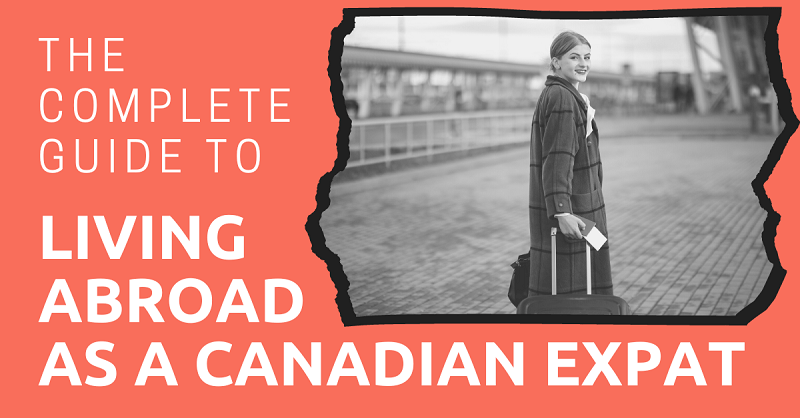
Canada is one of the best countries to live in for several reasons: we have a great healthcare system, abundant job opportunities, and stunning landscapes. That being said, there are many countries around the world that you can consider moving to.
But perhaps you’re intimidated by the idea of moving abroad. After all, there are plenty of factors to consider, such as where to live, how to get a visa, and what to do with all your personal belongings.
As a Canadian expat who spent two and a half years in Singapore, I know that the experience of being an expat can be overwhelming. I want to ensure you don’t face the same challenges that I did, so this guide aims to ease your concerns and equip you for life abroad.
I’ll discuss the benefits of living abroad, potential work opportunities, and ways to prepare for your move.
While specifics may vary depending on your chosen destination, I’ll provide you with general information that can be applied regardless of where you move.
This article will take approximately 21 minutes to read. Don't have the time right now? No worries. You can email the ad-free version of the article to yourself and read it later!
Disclaimer: This article may include links to products or services offered by ExpatDen’s partners, which give us commissions when you click on them. Although this may influence how they appear in the text, we only recommend solutions that we would use in your situation. Read more in our Advertising Disclosure.
Contents
Benefits of Living Abroad
If you’re still hesitant about moving abroad, knowing the benefits of doing should help you make an informed decision.
In my experience, moving to Singapore was a good decision. It helped me learn about different cultures, gain valuable work experience, and expand my professional and personal networks.
Here are several benefits you may enjoy while living abroad:
Career Advancement
Moving abroad can present an excellent opportunity to advance your career. Many international companies actively seek out Canadians with the necessary technical expertise and knowledge. With appropriate credentials and experience, you can pursue higher-level positions abroad that often come with a more competitive salary.
Some of the most popular industries for Canadians working abroad include education, finance, consultancy, information technology (IT), healthcare, and hospitality.
Cultural Immersion
No matter where you go, even if it’s just to the United States, you’re going to be immersing yourself in a culture that’s different from Canada’s. This is a great way to learn about the world and the different types of people within it.
You can learn about different foods, traditions, holidays, and customs to broaden your perspective and enrich your life.
Lower Cost of Living
As the cost of living in Canada increases, more Canadians are willing to leave the country to stretch their dollars.
Some countries have a much lower cost of living than Canada. This means, even if you’re getting a lower salary than you would earn in Canada, you may be spending less money on things such as rent, utilities, and groceries.
Adventure
The benefit that motivated me the most to move abroad is the potential for adventure. Moving abroad is super scary, but it gives you the opportunity to push yourself out of your comfort zone.

I met so many amazing people and had such unique experiences that I never would have if I didn’t move to Singapore.
Language Learning
One common concern that often discourages people from moving abroad is the language barrier. However, I suggest viewing it as a positive aspect. It provides a unique opportunity to fully immerse yourself in another culture and language, offering the best way to learn a new language.
While it may take some time, it’s worth noting that many people abroad speak English, which mans you can leverage your current language skills during the transition.
Work Opportunities
Finding work, no matter where you are, can be time-consuming. This is why it’s best to secure a job before moving abroad. Ensuring you have the appropriate work visa and necessary documents is crucial to prevent any complications that could lead to being sent back to Canada shortly after your arrival.
As I mentioned earlier, many companies abroad hire Canadians in various industries, such as finance, technology, hospitality, tourism, and education.
Here are some websites you can use to find work abroad:
Check the postings on these and other job boards to ensure you have the right skills, experiences, and credentials. You should also do some research on hiring companies and learn about their goals and values, so you can determine whether they align with your career goals.
Additional avenues to find work abroad include transferring to an international branch if your company has one, participating in a work exchange program, volunteering, or working with a recruitment agency.
Taxation
When you move abroad, you may still be required to pay taxes in Canada, depending on your residency status. The Canada Revenue Agency (CRA) determines if you’re a resident or non-resident for tax purposes based on whether you left Canada permanently or temporarily and still have ties to the country.
They’ll assess primary and secondary residential ties, such as whether you have a house, spouse, common-law partner, dependents, personal property, social ties, economic ties, or health insurance.
If they determine you’re a resident, you must file a tax return. To avoid paying taxes twice, in your new home country and Canada, it’s essential to note that Canada has established double-taxation agreements with many countries.
Even if the CRA classifies you as a non-resident, you won’t be required to pay taxes on your foreign income. However, you are still obligated to file a tax return in Canada if you receive any income within the country, such as from investments.
So, before departing Canada, make sure to complete Form NR73 to enable the CRA to determine your residency status. This step ensures you can accurately file your taxes and helps you avoid any potential fines upon your return to Canada.
You can find out more on the CRA website.
Best Countries for Canadians to Live Abroad
When planning a move abroad, you need to choose the most suitable country for you. Given the multitude of options, it’s important to do some research.
If your plan is to move to a country that you’ve always wanted to visit but are unfamiliar with, it pays to learn more about their culture, laws, cost of living, and job opportunities.
Doing research beforehand gives you an idea of what to expect, therefore minimizing culture shock once you arrive.
If you’re concerned about experiencing culture shock, it might be helpful to choose a country that has similar customs to Canada, such as the United States.
These five countries are excellent options for Canadians looking to become expats:
Mexico
If you want to stay close to home but are tired of Canada’s freezing winters, Mexico is a great option for you.
You can enjoy the delicious cuisine and constantly warm weather in Mexico. In addition, you’ll have access to healthcare services in Mexico, which are much more affordable than in Canada. During my two-month stay in Mexico, I visited the dentist, knowing that the cost would be significantly lower. I had a root canal procedure done at one-third of the cost it would be in Canada.
Canadians are eligible for many temporary visas in Mexico, including the digital nomad visa, which is a great option for people who work remotely. Since the cost of living in Mexico is relatively lower than in Canada, you can easily afford to rent a spacious house or apartment and still have more than enough to indulge in plenty of leisure activities, such as visiting the beach during your days off.
If you prefer an in-office job, you can get a Mexican work permit that will allow you to live and work in Mexico for up to four years. Some of the most popular industries in Mexico for expats are finance, healthcare, education, tourism, hospitality, and telecommunications.
Spain
Spain is a prominent European destination for many Canadians seeking to live abroad. A significant number of expats begin their Spanish experience as North American Language and Cultural Assistants, aiding in English language instruction for students under the guidance of seasoned teachers.
The pay can be low as it’s typically part-time work, so you may receive a monthly stipend of only 800 to 1,000 euros. The upside is that having a part-time job gives you more time to explore the country or visit neighboring countries, as travelling around Europe can be fairly affordable when you’re already in it.
In addition, while doing part-time work, you’ll have time to apply for other jobs, which you can actively pursue after completing the program or opt to transfer to a Spanish work visa for continued employment.
If you’re between the ages of 18 and 35, you can also consider applying for the Canada-Spain Youth Mobility program. The program offers five different types of visas for students, recent graduates, and young professionals, allowing you to apply for a visa that suits your situation.
Singapore
Having lived in Singapore myself, I felt it was necessary to include it in this list. During my time there, I met numerous Canadians who, I have no doubt, would wholeheartedly agree with my recommendation.
Teaching English in Singapore is a popular job among Canadians. It’s what I did, and the pay was much higher than in many other places in Asia, primarily due to the high cost of living in Singapore.

Additionally, I encountered several Canadians working in finance, IT, and business while in Singapore. The country tends to favor hiring Canadian expats with professional experience and strong credentials in these fields.
And because Singapore is an excellent travel hub, there are plenty of affordable flights to various Asian countries. So, while living there, I often took advantage of this and would visit Malaysia or Thailand on weekends as they were just a short flight away from Singapore.
Thailand
If you want to live somewhere in Asia where the cost of living is low, Thailand is a great option.
Note that the visa application processes in Thailand take longer than in some other countries. Initially, you need to obtain a non-immigrant visa to enter the country with the intention of working, and then you can proceed to apply for a work permit.
Like many other countries, teaching English in Thailand is a popular job for Canadians. You can also find work in the hospitality and tourism industries.
Australia
If you’re looking to move a bit further away, Australia is about as far as you can get from Canada.
Many young Canadians move to Australia because applying for a working holiday visa is relatively easy. The age limit to apply for this type of visa in most countries is 30. However, Canadians have the advantage of being eligible for this visa in Australia until they reach the age of 35.
Many individuals on this visa often find employment in the hospitality sector since it permits a one-year stay in the country. As a result, it may not be a good option for people looking for long-term opportunities. But for those who just wish to travel and explore more of the world, living and working in Australia is a great choice.
How to Prepare for Your Move
Preparing for your big move can help make the process less daunting. Since there are many things to consider, here are some steps you can follow to make your transition easier.
Visa and Residency
Once you have narrowed down your choice of country to a select few destinations, you can begin researching these countries’ visa requirements.
Your eligibility for a visa and the application processes often depend on factors, such as your age, credentials, and experience.
However, because the Canadian passport is powerful, you should be eligible for a visa in most countries. Still, learning about your eligibility before you begin applying for any job can save you a ton of time.
Don’t stress too much about the visa application process. Once you find a job, your employer will likely help you with the application processes, although you might want to make sure you’re eligible beforehand.
Save Money
If you chose to move to a country with a high cost of living, like I did when I moved to Singapore, you may need to have some savings.
Moving can be expensive, even to a country with a lower cost of living than Canada. You may have to shoulder the cost of your flight, rent, food, and other expenses as you try to get settled.
Some employers may reimburse you for these costs, while others won’t. Whether your employer will cover the costs of such expenses should be stated in your employment contract.
In any case, it pays to have some savings on hand that you can use until you receive your first paycheck. You might also consider withdrawing cash and exchanging it for the local currency of your new destination before your arrival. This way, you have funds readily available to use until you have the opportunity to open a local bank account.
Prepare the Paperwork
One thing you’ll notice when you start preparing to move abroad is that there’s a lot of paperwork to complete and keep track of.
Your employer may need things like copies of your degree, Canadian passport, or medical records, to apply for your visa for you.
They’ll also send over documents for you, like a job contract, that you should read and sign carefully.
Creating a file of all these vital documents can keep them organized and ensure you don’t forget anything when you move.
Find a Place to Live
Finding a place to live may be easier when you arrive, but you can do some initial research online. Look into different neighborhoods to find one that’s safe and conveniently located near your workplace or accessible to public transportation.
Browse real estate websites to gain a better understanding of rental costs (or property purchase options if you’re interested and capable). If the cost of living in your chosen destination is exceptionally high, you might need to consider sharing accommodations with roommates.
It’s advisable to arrange property viewings for your first week, especially since you’ll likely be staying in a hotel or any temporary accommodations upon your initial arrival.
Find a School for Your Children
If you’re moving abroad with your children, you’ll need to find a good school for them.
If your children are fluent in the native language of your destination, you can consider a local school. But if they aren’t, opting for an international school may provide them with a smoother transition to their new environment.

Many countries have Canadian international schools, enabling your children to maintain the same curriculum they were accustomed to at home.
This way, they can meet other Canadians, foreigners, and local students, which can help minimize their culture shock.
The only downside is that international schools can be much more expensive than public schools.
Get Health Insurance
You may not currently have health insurance, given the high quality of Canadian healthcare, but you’ll definitely need one when you move abroad.
Your company may offer health insurance as part of their benefits package. If they don’t, ask the HR department for information about local insurance companies.
Make sure to choose an insurance package that meets your needs. For example, if you plan to travel to different countries once you’re settled in, get a plan that offers international coverage.
Set Up an International Bank Account
Your new employer will need your bank details to pay your salary, which may require you to open a local bank account.
Find out which local bank is best for your needs. You can open just a savings account where your pay will be deposited. You can also consider obtaining a credit card for everyday purchases, eliminating the need to carry huge amounts of cash for purchases.
Don’t forget to close your Canadian bank accounts that you won’t need anymore or that you won’t be able to use abroad.
When I moved to Singapore, I closed my tax-free savings account (TFSA) because, as a non-resident, any contributions I made were subject to a 1% tax each month, as opposed to remaining tax-free. I opened a savings account in Singapore instead.
Learn the Language
If you opt to live in a country where the national language differs from English or French (supposing you can speak French), it’s advisable to consider starting to learn that country’s language.
Try to at least learn the basics, so you can communicate with locals and feel more comfortable interacting with people in your new environment.
There are many ways to learn a new language, such as taking classes, using language-learning apps, or talking to native speakers.
Update Family, Friends, and Work
Once you’ve finalized all the details of your move, such as your departure date, it’s time to inform your family, friends, and workplace.
Your family and friends are probably aware that you’ve been applying for jobs abroad, but this might be news to your coworkers. It’s important to provide them with the appropriate notice, which is typically two weeks in Canada. This helps maintain a positive relationship with your employer, ensuring that you have references if you ever plan to return to your job in Canada.
Pack Your Belongings
Once all the logistical aspects of your move are all sorted out, you can shift your focus to packing. Preparing for an international move can be a daunting task. While you may want to bring all your personal belongings, it’s often advisable to pack less, as it can simplify the process.
If you’ve traveled before, you’re likely aware that airlines often charge exorbitant fees for carry-on and checked baggage. Shipping your belongings can also be costly. If your job offer doesn’t cover shipping expenses, it’s generally more cost-effective to bring fewer items with you.
Here’s some advice on how to pack and store your property.
House
If you own a property in Canada, such as a house or condo, you have to decide whether to sell it or rent it out before you move.
There are benefits to doing either of the two. Selling your property can give you some money to get started in your new country, but it might add some stress to the moving process as the real estate market can be slow.
If you’re uncertain about whether you want to make your new country your permanent home or return to Canada in the future, you might consider the option of renting out your property instead.
This way, you can earn passive income by renting it out and you have somewhere to come home to when or if you decide to move back to Canada.
While a property manager or letting agent may do most of the work for you, you’ll still have a role in managing your property when you’re abroad, so don’t forget to consider this when making a decision.
Here are some websites you can use to advertise your property if you opt to rent it out while you’re away:
You’ll also have to file taxes on the income you earn on your property, even if you’re a non-resident.
Car
If you’re moving to a nearby country, such as the United States or Mexico, you may want to come back to Canada a lot.
In this case, keeping your car might be a good idea. In all other cases, it’s probably best to sell your car.
You can buy one in your new country if you want to drive or just use public transport.
Clothes
Clothes will take up the majority of your suitcases’ space, as they’re easy to transport. To choose which pieces you want to take, consider the climate of the country you’re moving to.
When I moved to Singapore, I brought a lot of pants and sweaters with me, only to realize it was way too hot to wear any of it, and it took up precious space in my closet.
Consider the dress code for your new job as well, as you may need more formal clothes.
Don’t forget, you can always shop when you arrive, so there’s no need to bring your whole wardrobe with you.
You can store any leftover clothes you have with a friend, family member, or in a storage locker. If there’s any items you aren’t tied to, you can also donate them to a charity store like Goodwill or Salvation Army.
Furniture
If you’re selling your house, you might want to consider selling the furniture along with it, as shipping large items to your new country can be costly.
The same principle applies if you decide to rent your property; offering it furnished can allow you to charge a higher rent.
If you have any items you want to keep, you can put them in storage for when you’re ready to come back to Canada.
Pets
If you have any pets, it may make the moving process more complicated. You can take them with you, but the process to do so will be lengthy. An alternative option is to ask family or friends to keep your pets. You’ll likely miss your pets, so make sure you weigh the pros and cons of both options.
Every country has its own rules for bringing in pets. For example, you may need to apply for an import permit and pet passport.
To be eligible for entry into another country, pets typically need to be microchipped and vaccinated as well.
Another important thing to consider when moving with your pets is finding a pet-friendly apartment, condo, or home in your new country. This can make your search more challenging, so it may not be the ideal option for everyone moving abroad, especially if the plan is for a relatively short-term stay, such as a year or two.
Now, on to You
Moving abroad may be one of the scariest things you can do, but it will also be the most rewarding. Relocating to Singapore was the best thing I ever did. I learned so much about different cultures, visited places I’ve never dreamed of visiting, and met so many amazing people.
You don’t have to take my word for it. Take the risk and move abroad yourself! Make sure to bookmark this guide to streamline the transition process and avoid the challenges I faced.







